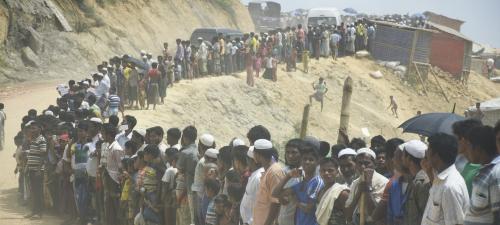Accountability a key pillar for reconciliation in Myanmar: UN Envoy
Accountability and inclusive dialogue are two important pillars for national reconciliation in Myanmar, said the Special Envoy of the Secretary-General (SESG), Christine Schraner Burgener in a statement released on Saturday, adding that “credible fact-finding is the first step towards accountability.”

Thousands of Rohingya refugees line the roads of the Kutupalong mega refugee settlement as the UNSC visit takes place. Many hold signs welcoming the visit and saying they want justice, as well as stating their key demands for repatriation.
Ms. Schrager has been on a 10 day visit to Myanmar, where she has held consultations with State Counsellor Daw Aung San Suu Kyi, other government and military leaders, ethnic armed organizations, local and religious leaders, NGOs, UN agencies and the diplomatic community.
In Rakhine and Kachin provinces, Ms. Burgener engaged with local civilian and military authorities, and directly with those affected by conflict, in particular women, and went to several camps and relocation sites for internally-displaced people, to gauge progress made since her first visit to the country in June 2018.
UN agencies and the Myanmar Government reached an agreement in June to create conditions that would allow Rohingya refugees to voluntarily and safely return to their homes in the country’s Rakhine province.
Almost a million Rohingya are sheltering in camps across the border in the Cox’s Bazar region of Bangladesh, after being driven from their homes in northern Myanmar since last August.
To ensure that they, and people are able to return home, their full human rights must be respected, Ms. Burgener said, starting with equal access to education and health, and freedom of movement: “they have to be able to live in safety and security. This will be the most positive incentive for the refugees in Bangladesh to return. Knowing that the UN and its partners are present at their places of return, will give the returnees confidence and trust in the process.”
Ms. Burgener also emphasized the need for greater domestic and foreign investment in the region, one of Myanmar’s poorest, which urgently requires inclusive development.
In Kachine province, the Special Envoy met with inhabitants of a camp for internally displaced people around Myitkyina, some of whom have been displaced since 2011 without job prospects or hope of returning to their places of origin, due to land-mines and lack of security, and took note of the increasingly limited humanitarian access which affected the availability of medical assistance and aid.
Expressing concern about intensified fighting in the north of the country, Ms. Burgener reiterated her offer to serve as a “bridge” between the Myanmar Government and ethnic armed groups, in order to help advance the peace process.
Offering her views on Myanmar’s democratic transition, the Special Envoy urged the Government to undertake a public “Zero Tolerance for Discrimination” campaign at the highest level, and committed to focusing her efforts on strengthening engagement between Myanmar and the international community towards a “more tolerant, democratic and inclusive society that recognizes diversity as an asset.”
Source:United Nations
- 248 reads
Human Rights
Ringing FOWPAL’s Peace Bell for the World:Nobel Peace Prize Laureates’ Visions and Actions

Protecting the World’s Cultural Diversity for a Sustainable Future

The Peace Bell Resonates at the 27th Eurasian Economic Summit

Declaration of World Day of the Power of Hope Endorsed by People in 158 Nations

Puppet Show I International Friendship Day 2020

